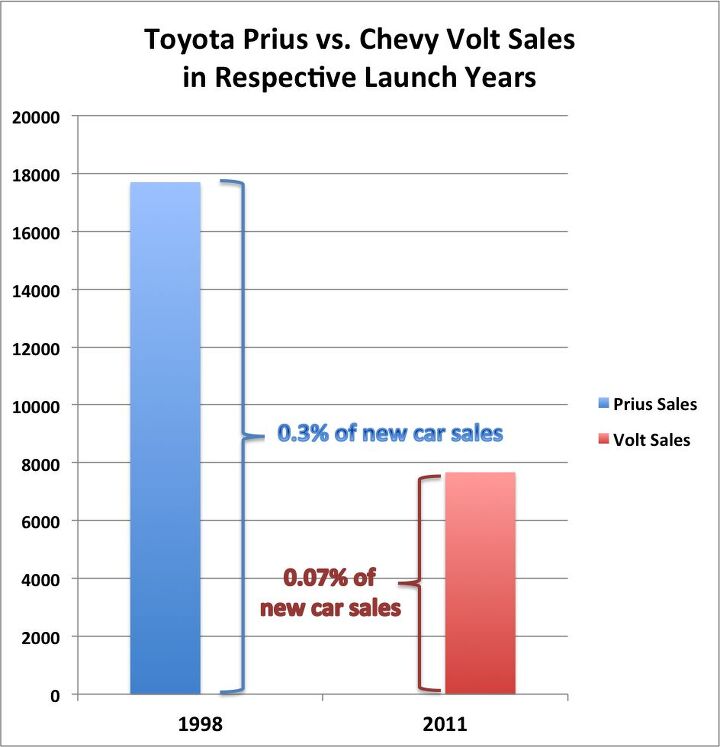Dan Akerson Says First Year Sales Of Volt As Good As Prius, Grows Long Nose

The repeated stoppages of the Volt production triggered rumors that GM might discontinue the Volt altogether.
Dan Akerson himself had to come to the rescue of the embattled plug-in. Saying that “we are not backing away from this product,” Akerson promised more advertising and less volume. So far, so good.
Then, Akerson did something really bad. Surprisingly, Akerson used Toyota as a benchmark and reportedly said that “Toyota sold about the same amount of Prius in its first year as the Volt in its first year.”
Utter nonsense.
- The Toyota Prius was launched in Japan in December 1997. In its first year, the Prius sold some 18,000 cars.
- The Chevrolet Volt was launched in the U.S. in December 2010. In its first year, the Chevrolet Volt had sold some 8,000 cars. That would be less than half of what the Prius sold in 1998.
It gets worse.
- The Prius was launched in Japan only and was not sold in other markets until the year 2000. In 1998, the market in Japan was 5,9 million cars.
- The Chevrolet Volt was launched and sold in the U.S. In 2011, the size of the U.S. market was 12.8 million units.
In the first year, the Volt sold half of what the Prius had sold in the first year. And that in a market twice the size.
It gets worse.
- The Prius was launched when the barrel of oil was practically given away. The barrel of crude did cost $11.91 in 1998. Only 1974 was it cheaper. Alright, inflation adjusted, the barrel did cost $16.50 in 1998. Inflation adjusted, that was the lowest price since World War II. As we all fondly remember, that was not the time to spend a lot of money to save cheap gas, especially not at the end of Japan’s lost decade.
- When the Volt was launched, the price of oil was exploding. The barrel of crude did cost $87.04 in 2011. Saving fuel had turned into a doctrine.
In the first year, the Volt sold half of what the Prius had sold in the first year. And that at a time when gasoline did cost twice as much as when the Prius was launched.
If Akerson would know more about cars, then he would not have to tell lies. He also would know that Toyota had been terribly unhappy about the initial sales of the Prius. What should give Akerson further pause are rumors from Toyota that sales of the plug-in hybrid version of the Prius, launched in Japan in January, are not going well. There are no numbers available, but all I am hearing is that the Aqua/Prius C compact hybrid is selling like hotcakes, while the plug-in Prius is collecting dust. Again from what I am hearing, people balk at the price. The regular Prius in the G trim costs 2,520,000 yen ($30,000) in Japan. The G-trim Prius plug-in hybrid costs 3,400,000 yen ($41,000). All prices including tax.
People seem to shun the plug-in, and instead go for the Prius, or its smaller sibling the Prius c. That one costs 1,850,000 yen ($22,000) in the G trim. The Prius is Japan’s best-selling car, the Aqua / Prius C has become Japan’s third-best-selling car right out of the gate. Price is a big driver of the success of a car. Price is the biggest problem of the Volt. Even with a generous (and unsustainable) subsidy, it is way too expensive. The example of the Prius Plug-in Hybrid proves an old adage in the business: People may swear up and down that no price is too high when it comes to the environment. Once in the showroom, they buy the car that makes sense.
Oh, and back to Akerson. I know how to get him out of this. He should say he was misquoted. He should say he meant calendar year. Launched in December 1997, the Prius sold 323 in that month and year. Launched in December 2010, the Volt sold 326 in that month and year. I know, it’s a lame excuse, but it beats being called a liar.

Bertel Schmitt comes back to journalism after taking a 35 year break in advertising and marketing. He ran and owned advertising agencies in Duesseldorf, Germany, and New York City. Volkswagen A.G. was Bertel's most important corporate account. Schmitt's advertising and marketing career touched many corners of the industry with a special focus on automotive products and services. Since 2004, he lives in Japan and China with his wife <a href="http://www.tomokoandbertel.com"> Tomoko </a>. Bertel Schmitt is a founding board member of the <a href="http://www.offshoresuperseries.com"> Offshore Super Series </a>, an American offshore powerboat racing organization. He is co-owner of the racing team Typhoon.
More by Bertel Schmitt
Latest Car Reviews
Read moreLatest Product Reviews
Read moreRecent Comments
- Jalop1991 In a manner similar to PHEV being the correct answer, I declare RPVs to be the correct answer here.We're doing it with certain aircraft; why not with cars on the ground, using hardware and tools like Telsa's "FSD" or GM's "SuperCruise" as the base?Take the local Uber driver out of the car, and put him in a professional centralized environment from where he drives me around. The system and the individual car can have awareness as well as gates, but he's responsible for the driving.Put the tech into my car, and let me buy it as needed. I need someone else to drive me home; hit the button and voila, I've hired a driver for the moment. I don't want to drive 11 hours to my vacation spot; hire the remote pilot for that. When I get there, I have my car and he's still at his normal location, piloting cars for other people.The system would allow for driver rest period, like what's required for truckers, so I might end up with multiple people driving me to the coast. I don't care. And they don't have to be physically with me, therefore they can be way cheaper.Charge taxi-type per-mile rates. For long drives, offer per-trip rates. Offer subscriptions, including miles/hours. Whatever.(And for grins, dress the remote pilots all as Johnnie.)Start this out with big rigs. Take the trucker away from the long haul driving, and let him be there for emergencies and the short haul parts of the trip.And in a manner similar to PHEVs being discredited, I fully expect to be razzed for this brilliant idea (not unlike how Alan Kay wasn't recognized until many many years later for his Dynabook vision).
- B-BodyBuick84 Not afraid of AV's as I highly doubt they will ever be %100 viable for our roads. Stop-and-go downtown city or rush hour highway traffic? I can see that, but otherwise there's simply too many variables. Bad weather conditions, faded road lines or markings, reflective surfaces with glare, etc. There's also the issue of cultural norms. About a decade ago there was actually an online test called 'The Morality Machine' one could do online where you were in control of an AV and choose what action to take when a crash was inevitable. I think something like 2.5 million people across the world participated? For example, do you hit and most likely kill the elderly couple strolling across the crosswalk or crash the vehicle into a cement barrier and almost certainly cause the death of the vehicle occupants? What if it's a parent and child? In N. America 98% of people choose to hit the elderly couple and save themselves while in Asia, the exact opposite happened where 98% choose to hit the parent and child. Why? Cultural differences. Asia puts a lot of emphasis on respecting their elderly while N. America has a culture of 'save/ protect the children'. Are these AV's going to respect that culture? Is a VW Jetta or Buick Envision AV going to have different programming depending on whether it's sold in Canada or Taiwan? how's that going to effect legislation and legal battles when a crash inevitibly does happen? These are the true barriers to mass AV adoption, and in the 10 years since that test came out, there has been zero answers or progress on this matter. So no, I'm not afraid of AV's simply because with the exception of a few specific situations, most avenues are going to prove to be a dead-end for automakers.
- Mike Bradley Autonomous cars were developed in Silicon Valley. For new products there, the standard business plan is to put a barely-functioning product on the market right away and wait for the early-adopter customers to find the flaws. That's exactly what's happened. Detroit's plan is pretty much the opposite, but Detroit isn't developing this product. That's why dealers, for instance, haven't been trained in the cars.
- Dartman https://apnews.com/article/artificial-intelligence-fighter-jets-air-force-6a1100c96a73ca9b7f41cbd6a2753fdaAutonomous/Ai is here now. The question is implementation and acceptance.
- FreedMike If Dodge were smart - and I don't think they are - they'd spend their money refreshing and reworking the Durango (which I think is entering model year 3,221), versus going down the same "stuff 'em full of motor and give 'em cool new paint options" path. That's the approach they used with the Charger and Challenger, and both those models are dead. The Durango is still a strong product in a strong market; why not keep it fresher?




































Comments
Join the conversation
I have to say that this is IMHO a tempest in a teapot. Bertel has indeed over-reacted to a throw-away remark by a CEO who probably heard the remark from someone at a meeting and seized on it as a talking point -without any actual detailed knowledge of the context of the remark beyond the raw numbers. If someone had called him on it on the spot, he'd have stumbled and turned to his staff. Anyone who has done staff work for one of these guys knows how that is. To lie requires intent to deceive. To misinform only requires ignorance. I used to just hold my breath and wait everytime my boss spoke in public. Unless he was throughly briefed (read trained and drilled) he might come out with any damned thing. I would tend to dismiss this as puffery, and frankly irrelevant. The circumstances of the two rollouts vary too much to be comparable, and even if they somehow were, what useful knowledge could you gleam from it? One might say that it shows that one or two years of saales data tell you nothing about the long term viability of a car in the marketplace. Some see sales grow from nothing (Corvette) and others see good initial sales vanish (Vega). Ain't tellin' till you roll those dice for a few more model years.
This parsing stuff is fun and all, but it would be more helpful to address with the substance of Akerson's comments. Akerson is saying that the Prius had a slow US launch. He's right -- it took years before the Prius ever hit the sort of volumes that would be considered to be mainstream for a compact car that lacks luxury branding. The substantive question to ask is whether this is a good comparison, i.e. whether the Volt will ever achieve the sort of sales volume in the US that the Prius eventually did. For a variety of reasons, I expect that the answer to this will prove to be "no". But that's going to be difficult to talk about if SOP is going to be to denounce Akerson as being sort of conniving liar, when perhaps he should be just taken to task for being unduly optimistic.